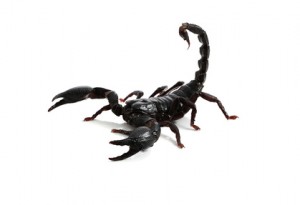

Scorpions are found all across the United States, but of course are most common in desert climates. They are actually not insects. They have eight legs and are considered arachnids. They are ambush predators that hide behind and under stones, sticks, and other objects that provide cover. Yet, they are known to take up residence in your home. If you have a scorpion problem, you don’t need anyone to tell you that you need help fixing it. So, here is some helpful know how.
Scorpion Stings
Everyone knows of the scorpions’ hallmark tail with a poised stinger that is curled over their backs ready to strike. If you live in an area prone to scorpions, do not go barefoot to the bathroom in the middle of the night when they are most active. Even though there is only one particular species, the Arizona bark scorpion that can cause a significant and possibly fatal medical threat (aside from allergic reaction), all scorpions release a neurotoxin venom that is painful. It can cause side effects such as:
Habits of Scorpions
These unique arachnids sense vibrations through their pectines. Pectines are unique to scorpions and serve as sensory organs on the underside of their carapace that resemble teeth like combs. They have poor eyesight in all eight of their eyes and would probably be considered legally blind if they were human. They do not have silk like other arachnids and choose to burrow instead. If they are in your home, that means they have found a more suitable environment. They are either escaping conditions that are too wet or too dry or they are looking for more food.
Common Entry Points
To take care of your scorpion problem you will need to seal up the places they are coming in. Your pest control servicer will be able to identify these areas and take care of any exclusion needs. They find a space to enter your home through gaps around doorways and windows. They also come up from the basements or crawl spaces.
Identifying an Infestation
The truth is that aside from seeing them, they do not leave behind many signs of their stay. They prefer inside sinks, under sinks, and in bathtubs. One disturbing sign you may see is the dried out carcasses of smaller insects that have been consumed by the scorpion grouped in the corner behind the door, toilet, or under the cabinet. Like spiders, they can only consume a liquid diet and leave behind white poop that dries like chalk. Taking care of your scorpion problem requires calling your pest control servicer.
